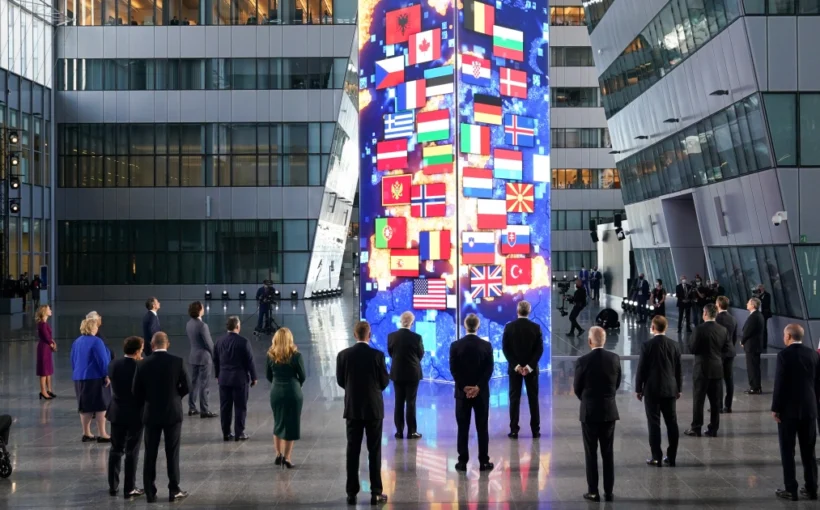Polish President Andrzej Duda called on NATO to deploy additional forces on its eastern flank and step up its air policing mission in response to Russia’s recent military build-up close to the border with Ukraine.
The U.S. and other Western allies have issued stern warnings about the Russian mobilization in recent days, amid concern the Kremlin could be preparing for a potential full-scale invasion.
“Caution and vigilance from NATO, which is responsible for the military security of the allies, is necessary,” Duda said Thursday at a joint press conference with NATO Secretary-General Jens Stoltenberg, during a visit to alliance headquarters in Brussels.
“That should be demonstrated through the strengthening of the strategic surveillance of the region … through strengthening of the air policing mission — and I mentioned that in my conversation with the secretary-general — also strengthening of observation surveillance and strengthening of NATO units along the eastern flank of the alliance,” Duda said.
Duda and Stoltenberg discussed the Russian build-up as well as Poland’s border conflict with Belarus, in which the dictator Alexander Lukashenko has sought to weaponize migrants by encouraging them to travel to Minsk, then pushing them to cross illegally into Poland. Lukashenko first used the tactic against Lithuania last summer.
Duda said Lukashenko’s hybrid attack on the EU should be seen as part of a package of destabilizing aggression by Belarus and Russia, along with a recent spike in gas prices and a reduction in supplies, as well as the Russian military mobilization.
“They have to be coordinated,” Duda said. “It’s hard to assess it otherwise.”
In regard to the situation in Ukraine, an EU official said that in addition to more customary movements of troops, tanks and other weaponry, Russian forces appeared to be constructing field hospitals and other support capabilities not seen in previous mobilizations, including a similar build-up along the border last spring.
Stoltenberg did not specifically comment on Duda’s proposals for additional troop deployments or stepped-up air policing, but he said NATO foreign ministers would discuss the Russian mobilization at a meeting in Riga, Latvia, next week. He called on Moscow to dial back the tensions and promised additional help to Ukraine.
“We see a large and unusual concentration of forces, combined with aggressive rhetoric and disinformation from Moscow,” Stoltenberg said. “So we call on Russia to be transparent, reduce tensions and de-escalate. NATO remains vigilant, and we continue to provide Ukraine with political and practical support. This is not a threat to Russia and it helps Ukraine to defend itself from aggression.”
Earlier this month, France’s foreign and defense ministers issued a warning to Moscow about further encroachments on Ukraine’s territorial integrity, following a meeting with their Russian counterparts in Paris.
On Thursday, Duda said that NATO allies were far better prepared to deal with the Russian threat than they were before the invasion and annexation of Crimea in 2014. The alliance now maintains an “enhanced forward presence” of troops in Poland and the three Baltic countries of Estonia, Latvia and Lithuania.
“NATO had to show that it was alive; NATO had to demonstrate that it was dynamic and that it responded to the current situation, that it was able to provide an adequate response to the times and to the behavior from potential aggressors,” Duda said. “NATO provided that kind of response.”
The Russian military mobilization comes as the EU is preparing for an Eastern Partnership summit next month, its outreach program to the former Soviet territories of Ukraine, Georgia, Moldova, Armenia and Azerbaijan. Russia has long opposed the Eastern Partnership initiative. Moscow’s efforts to prevent Ukraine from moving forward with political and trade agreements with the EU helped set off the Maidan Revolution of 2013-14 that toppled a Kremlin-allied government in Kyiv.
Russia is also eager to secure approval needed from German regulators to begin operating the newly-constructed Nord Stream 2 gas pipeline, and some analysts believe the rise in gas prices reflects an effort by Russia to pressure Germany and the EU to give the necessary go-ahead. At NATO, Duda bluntly reiterated Poland’s opposition to Nord Stream 2.
“We believe that this gas pipeline should never have been constructed — it is contrary to the interests of the European countries,” Duda said.
“It is dangerous for Europe,” he added. “Therefore, we believe that the certification process should be stopped.”
Source: Politico


